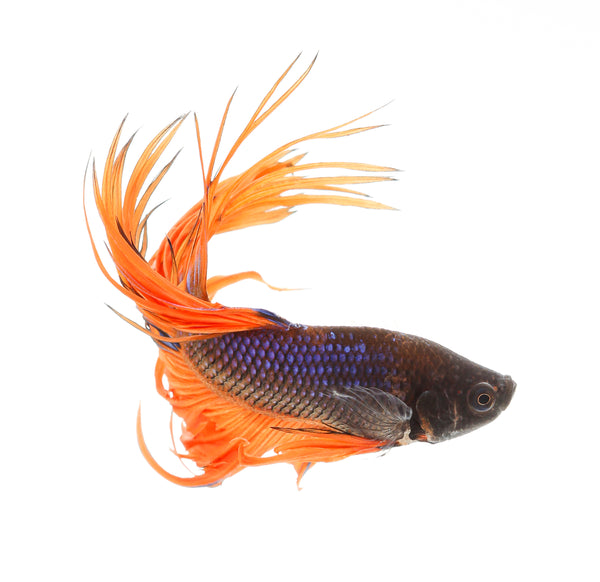- Continue Shopping
- Your Cart is Empty
Another potential obsession...Yeah, you "betta" believe it!
(Sarcastic tone here) Of course, I have no interest in yet ANOTHER group of fishes with fascinating behaviors, murky taxonomy, unique morphologies, and interesting natural habitats. Yeah...have no interest in them whatsoever...

And what happens...The so-called "wild Bettas"- those non-domesticated relatives of the ubiquitous poster-child for fish abuse, Betta splendens, rear their beautiful heads (and bodies, and tails) again...
Now, I'm no expert betta enthusiast.In fact, I've only kept a few species, and I've really only recently played with the "wild ones", so this little blog is simply going to be another one of those "shout outs" to something I need to try, and to peer-pressure others into getting involved with them so that I can vicariously experience keeping all of the cool ones through your work...Yeah, I'm pretty transparent that way. No shame here.
This is one very cool group, let me tell you.
Yeah, the genus Betta is no "one trick pony- there are like dozens (around 70-something when I last checked) of species, in more than a dozen "complexes."

It's a large, interesting group of small, really cool-looking fishes, many as far-removed in appearance, behavior, and husbandry requirements as the Honda in your garage is from a Formula One race car.

Yeah. Seriously.
Oh, and they pretty much all come from the kinds of habitats we all love here: slowly flowing, dimly-lit jungle streams, stagnant ditches, and peat swamps, with the sun diffused by layers of dense canopy growth.

Dark, tannin-and-humic-substance-stained water, with low pH and correspondingly minimal mineral content. The bottom is usually covered with decaying leaves, botanical materials, palm fronds, and tree branches. And you'll occasionally find other fishes, like unusual Rasbora and such, living with them.

(Rasbora kalochroma- Photo by Factumquntus, used under CC BY-SA 3.0)
You'll often see roots of terrestrial and marginal plants growing into the water near where the fishes may often be found...And little puddles and ditches...yeah! Bring it!

Yeah, this sounds pretty much like our kind of habitat to work with!
And the neat thing about many of these unique species is that they aren't all bubble nest builders, like you'd assume. Some, like my fave, Betta albimarginata, actually are mouthbrooders, like many of the cichlids we may have played around with now and again. Surprise.

(B. albimargniata Photo used under CC BY- S.A.3.0)
Some, like Betta brownorum, would totally appeal to people like me who love killies, and the many geographic population variants that may be attached to a number of species (such as the Fp. gardneri group, for example). These populations are really important to both scientists and wild Betta enthusiasts, who carefully document and label wild collected populations to maintain the purity of the bloodlines. Super cool.

(Summer Kathleen Meredith's amazing pic of her Betta brownorum. If this pic doesn't make you ditch those boring Australian Rainbowfishes once and for all, nothing will...)
They're not just fascinating fishes, and kind of cool to look at- they're remarkable for their adaptation to challenging habitats. In fact, at some points during the year, the fish may be survive by "bedding down" in a layer of super-damp leaf litter for several weeks as the water in the ditches, streams and puddles where you might find them isn't always present, and this "buys them some time" until it returns. That's seriously hardy...


Well, they deserve their own recognition, but these are super-cool fishes, regardless.
And of course, there are a LOT of enthusiasts out there, with more than a casual interest in these crazy-cool fishes.
And we've seen some beautiful botanical-style setups featuring them. One of the things I love about this group (and Apistos, for that matter), is that many hobbyists like to keep and breed them in more natural-looking/feeling setups, which I think is not only more visually interesting, it's probably far more calming and beneficial for the fishes themselves than a sterile breeding tank. Our friend Ron of Functionbuilt Aquatics (cool You Tube channel, btw), is obsessed with giving his wild Bettas really natural-lied conditions to breed in. Such a good practice.

And, it will give you a chance to experiment and learn a bit more about not only the fish- but the unique and alluring habitats from which they come.

So, the next time you're itching to set up a natural aquarium for a very special fish, heed the "call of the wild" and consider one of the many amazing wild Betta species for your next project. It'll satisfy your cravings to create an interesting aquarium, serve to highlight an amazing group of fishes, and help keep viable populations of these animals in captivity, removing some of the pressure off of their natural habitats from collection.
(Betta tussyae- yet another wild beauty!)
I can't believe it took me so many decades to get into these cool fishes- I hope you won't wait quite as long as I did!
Stay enthralled. Stay excited. Stay intrigued...
And Stay Wet.
Scott Fellman
Tannin Aquaitcs
3 Responses
Scott Fellman
Thanks for the feedback, guys! I’m glad to hear that you’re working with the Chocolates (one of my all-time fave fish!) in blackwater, Bob. So many fishes that are considered “challenging” just fare better in whatever their natural conditions are (be they blackwater, hard, alkaline water, brackish, etc.)- always good to see and hear about hobbyists keeping them under such conditions. Best of luck!
-Scott
Bob Woth
I have been keeping my Betta/brownorum/coccina in black water tanks for about 8 months now. I also am keeping chocolate gouramis in black water too. So far so good. I have been collecting rainwater and using you leaves, cones, banana stems in the water.
Carlos
Great post! I love wild bettas.







Scott Fellman
Author